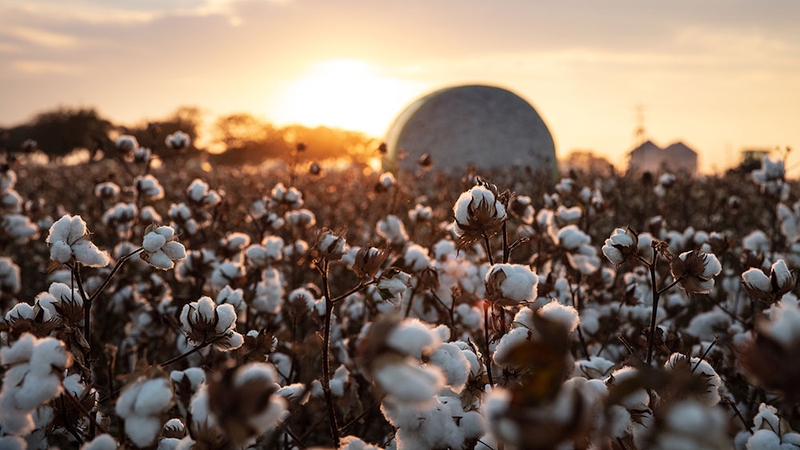Highly Variable Mississippi Cotton Crop Approaches Harvest
High temperatures and drought since early July left some cotton acreage in Mississippi not worth harvesting, while others with irrigation may still make an excellent crop.
“Statewide, cotton yields are highly variable depending on where you’re standing,” says Brian Pieralisi, Cotton Specialist with the Mississippi State University Extension Service.
This year, Mississippi growers planted 380,000 acres of cotton. The U.S. Department of Agriculture estimated on Sept. 3, 2023, that the crop was ahead of the five-year average rate of open bolls. But it estimated 10% of the crop was poor or very poor and 8% excellent, with the rest in fair or good condition.
Pieralisi says the acres in bad shape are in multiple counties in south-central Mississippi below Interstate 20.
“It is a disaster down there,” he says. “There is some irrigated cotton that will make a decent crop, but the dryland cotton had absolutely no moisture to make any kind of yield.”
Trey Bullock of Bullock’s Ag Consulting in Seminary said the area usually harvests 1,200-1,500 pounds of cotton an acre without irrigation. The area benefits from its proximity to the Gulf Coast, which typically brings summer afternoon thunderstorms.
“Since July 9 until Aug. 29 when it was too late, we had about three-tenths an inch of rain, and that wasn’t in one rain,” Bullock says.
Compounding the lack of rain were very high temperatures. Bullock notes the last full week of August had five days of temperatures between 105 and 109 degrees. Nighttime temperatures above 85 degrees meant the crop never had a chance to rest.
“The cotton crashed,” Bullock says. “The leaves drooped down so much each day from lack of moisture that they exposed the bolls to sunburn, and the bolls split.”
Growers may harvest about 1,000 pounds an acre of that cotton, a loss of about 500 pounds from what was expected.
About 14,000 acres of cotton were planted in the region affected by the severe drought and high heat. Bullock said the cotton crop is devastated in Smith, Covington, Jones, Forrest and Perry counties.
“About 50% of the crop is not worth putting a picker in, and if you do run it, you might get 200 pounds of cotton an acre at the most,” he says.
Most of the cotton grown in the Delta is irrigated, and Pieralisi says most of that looks good or even very good.
Cotton in north and northeast Mississippi got more moderate weather, including occasional rain. Some cotton in the hills and parts of north Mississippi around Batesville and Senatobia are seeing a strong crop.
Areas around Macon got a bad hailstorm followed by about three weeks of very wet weather. That cotton will only have a top crop, meaning it was able to mature cotton bolls only on the upper branches of the cotton plants.
Even cotton in areas with irrigation suffered from the high nighttime temperatures that came when the crop was at particularly vulnerable, reproductive stages.
“When the cotton plant is trying to set fruit, fruit retention suffers from high heat at night, especially when there’s no water,” Pieralisi explains.
Some cotton in Mississippi experienced cavitation, a rare phenomenon that happens when an air bubble forms in plant stems because of a lack of water. Stems bend over and die at this air pocket, limiting fruit set on those branches.
Despite the challenges and variability in crop conditions across the state, harvest is very near.
“A few Delta acres will start harvest about Sept. 10, with harvest beginning on the vast majority of acres around Sept. 15-20 and later the farther east and north you go,” Pieralisi says.
Very few cotton acres would benefit at this point from rain, so growers are now hoping hurricanes stay away and dry weather continues, allowing them to get the crop in safely.
Will Maples, Extension Agricultural Economist, says cotton prices on December futures reached 84 cents and stayed there for most of the growing season.
“Finally, toward the end of July, prices broke the 84-cent barrier, and as of Sept. 1, challenged 90 cents,” Maples says. “A price rally is supported by a deteriorating U.S. crop, as the west Texas crop continues to face hot and dry conditions.”
Hurricane Idalia damaged the cotton crop in Florida, Georgia, and the Carolinas, which added more market uncertainty, but Maples does not expect the price to move much.
“Globally, there is projected to be a 91-million-bale carryover from 2022 hanging over the market. A bigger hindrance on the cotton market is the lack of demand,” he says. “That lack of demand continues to grow. Without improved demand, prices will struggle to rally much higher.”









